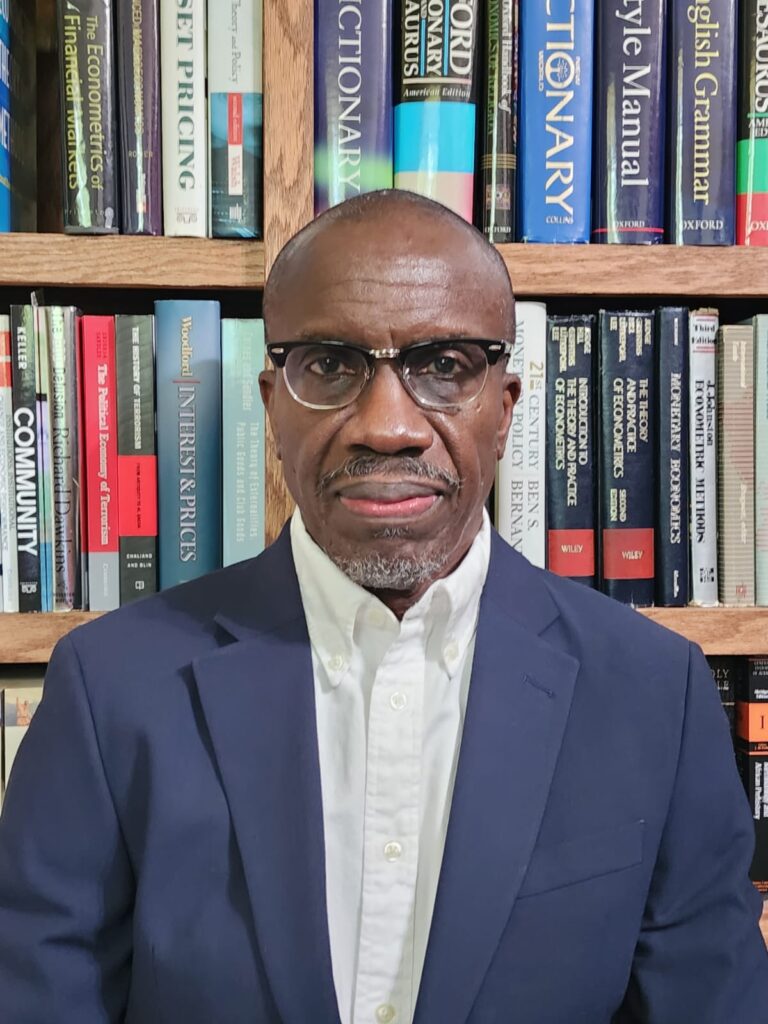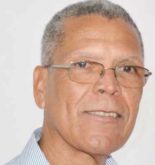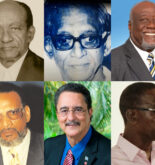by Prosper Raynold, PhD
“While the occasional Olympic medal and Nobel prize will lift our profile in the world, our greatness as a nation or society is more likely to be defined by the extent to which we are able to routinely elevate the average St. Lucian and the least amongst us to realization of their full potential.”
The Seeds and Fruits of Olympic Glory
Julien Alfred’s historic capture of gold and silver medals in the women’s hundred and two hundred meters at the 2024 Paris Olympics emphatically validated her commitment to excellence, her mental fortitude, and her resilience. Her parents, teachers, coaches and community deserve our eternal gratitude for creating the package of nurturing, guidance, interventions and opportunities that enabled her historic and triumphant journey.
Readers may garner further insight into the contents of this package and its indispensability by considering the following questions. What if instead of being the supportive, nurturing, and encouraging father he was, Julien’s father had failed to support and encourage his daughter before his untimely passing? What if, under the strain of single parenthood imposed by the tragic loss of her daughter’s father, Ms. Alfred’s mother—who heroically and gracefully navigated the hardships associated with being a working single mother to maintain her family’s integrity and to set an example of resilience in the face of adversity for Julien and her siblings—had not found the fortitude to do so?
What if Mrs. Calista Joseph-Virgile who identified Ms. Alfred’s talent and recommended her to coach Cuthbert “Twa Ti Ne” Modeste, and thereby, helped place a young Julien on a path to developing her prodigious talent had instead defined her responsibility to Julien and her other students so narrowly as to exclude the critical intervention she engineered? When the trauma of her father’s passing threatened to derail Julien’s commitment to developing her talent, an empathetic and generous Coach Modeste remained committed to helping her, refused to give up on her, and ultimately helped reignite her passion for running. What if he had lost faith in her and redirected his efforts to his other charges? What if those whose intervention ensured that Julien’s development would continue apace by arranging her enrollment at St. Catherine High School in Jamaica for an infusion of specialized resources and competition that they or St. Lucia could not provide had lacked the foresight to do so?
What if the business and governmental entities who, throughout the various stages of her journey, provided the financial assistance that made it possible for Ms. Alfred to make use of opportunities to hone her craft and acquire a tertiary education had excused themselves from responsibility to help her? Finally, what if Julien’s collegiate and Olympic coach, Edrick Floréal, for whom our Olympic champion has the highest praise, had been lax in discharging his responsibilities to her? Thankfully, in each of these instances, the people and entities who were in a position to enable Julien’s journey delivered for her. In so doing, they collectively constructed the package of nurturing, guidance, interventions and opportunities which imbued Ms. Alfred with the confidence that if she fully committed to her chosen discipline, she could achieve future greatness. She has achieved greatness even as that future continues to unfold.

St Lucians are rightly euphoric about the dominant performance of one of our own in two of the highest profile athletic events in world sport. I am equally impressed by Ms. Alfred’s authenticity and by the poise, modesty, and decency she projects in her media appearances. I estimate that Ms. Alfred’s relentless and disciplined pursuit of excellence, which has culminated in Olympic gold and silver for her, and vicariously for all of us, has inspired the young and the old, the rich and the poor, the powerful and the powerless in St. Lucia, in the Caribbean, and in the diaspora.
In a conversation with two Ugandan workmen who laid internet cables at my house just before the start of the 2024 Paris Olympics, I learnt that they were eagerly awaiting the start of the Olympics but had not heard of an island in the Caribbean called St. Lucia. Had their visit occurred after the finals of the women’s hundred-meter sprint, I strongly suspect that they would have known of the fairest isle. Reports of a massive surge in the number of internet searches for St. Lucia in the hours following Ms. Alfred’s gold medal performance are indicative of a bonanza of advertising exposure that the St. Lucia Tourism Authority could only dream of financing. This should lead to an increase in visitors to these shores and the attendant economic benefits. However, amidst the elation, celebrations, and anticipated financial windfall, we should be acutely cognizant of the non-trivial risk of failing to make optimal use of the opportunities for productive reflection occasioned by the exploits of arguably the greatest athlete in our history.
St. Lucia: Beacon of Hope and Opportunity?
“How many more of our people have the talent to become world-class athletes, cricketers, footballers, scientists, economists, artists, and writers but are unlikely to realize their full potential because they have not, and may never receive appropriately customized hope and opportunity packages?”
Amidst the euphoria and patriotic fervor, we would do well to remember that there are significant segments of our society who despite their dire need, are yet to receive appropriately customized packages of nurturing, guidance, interventions and opportunities. Our collective failure to deliver fuels the festering despair undergirding the ongoing escalation of crime and violence that is a threat to us all. The consequences of delivering Ms. Alfred’s package to her are self-evident and should inspire us to intensify our efforts to ensure that every citizen receives Alfred-like packages customized to provide what they need to realize their full potential and transform their dreams into reality. While the occasional Olympic medal and Nobel prize will lift our profile in the world, our greatness as a nation or society is more likely to be defined by the extent to which we are able to routinely elevate the average St. Lucian and the least amongst us to realization of their full potential. Despite our size limitations, St. Lucia can locate itself among the greatest of societies and we can get on the path to that location by committing to creation of an ecosystem that routinely delivers the Alfred-like packages that would allow all or at least most of our youth to realize their full potential in whatever line of human endeavor they choose to commit to.
It is likely that Ms. Alfred’s example has induced an increase in the confidence of the dispossessed and desperate that there are non-criminal actions they can take now that will lead to improvements in their future welfare. However, any such increase in confidence will be fleeting and ultimately insignificant if their despair-dispelling Alfred-like packages are not forthcoming. For example, if there are no vehicles or opportunities for newly inspired young people to parlay their newfound confidence into meaningful improvements in their current and future welfare, any current reduction in their sense of despair will be fleeting and despair will beget despair. Alternatively, if newly inspired and confident youth can find opportunities to convert these positive vibes into tangible life-improving actions, confidence will beget confidence.
The observation that despair begets despair implies that despair is a dynamic phenomenon in that at any given point in time, despair is either being amplified or dampened. Hope is the opposite of despair. As such, any change in an entity’s circumstances that increases its sense of hope or hopefulness implies a concomitant reduction in that entity’s sense of despair or desperation. Like despair, hope begets hope and is a dynamic phenomenon. This implies that the costs of missed opportunities to implement despair-dispelling, hope-enhancing changes in our society are not static but continue to grow, perhaps exponentially. For example, given that despair among some of our citizens encourages crime and violence, the costs of our failure to deliver Alfred-like packages to the desperate and dispossessed will not be limited to crime and violence staying at their currently unacceptable levels. Instead, crime and violence will increase, perhaps beyond what we are currently able to imagine. In this regard, the role of despair and the crime and violence it is enabling in the ongoing failure of the Haitian state is a cautionary tale we would do well to heed. Fortunately, the argument is symmetric. Should we find the will and sense of urgency to deliver the despair-dispelling, hope-enhancing Alfred-like packages that are so badly needed in some segments of our society, St. Lucia will be known not just as the home of, Julian Alfred, our Nobel laureates, the Pitons, and other natural wonders but more consequentially as a beacon of hope and opportunity.
Ms. Alfred’s accomplishments should inspire those among us who have opportunities to help ensure delivery of hope-enhancing packages to intensify our efforts to seize these opportunities. The desirability of this outcome is tethered to the reality that addressing existing pockets of hopelessness is an indispensable component of any comprehensive effort to permanently address the crisis of crime and violence that currently afflicts our society. However, beyond crime and violence, there is much anecdotal evidence that despite an abundance of talent among our people, inadequacies in our ability to marshal and develop this talent impairs the efforts of many of our citizens to realize their full potential. Perhaps the most persuasive piece of such anecdotal evidence is the fact that when our people have the right Alfred-type packages, which I will henceforth refer to as hope and opportunity packages, they tend to outperform. Ms. Alfred’s example is a prominent recent exhibit but there are other examples across a wide range of endeavors. The problem is that there could be many, many more. How many more of our people have the talent to become world-class athletes, cricketers, footballers, scientists, economists, artists, and writers but are unlikely to realize their full potential because they have not, and may never receive appropriately customized hope and opportunity packages? What fraction of our currently productive population is operating substantially below their potential because of inadequate hope and opportunity packages?
The Hope Hypothesis
“A society that is not dedicated to producing and enhancing hope is unlikely to thrive.”
My framing of these packages as “hope and opportunity” packages is potentially consequential in that it can provide practical guidance on the choices we as a society must make if we want to substantially improve not only the number of such packages we deliver, but also their efficacy. However, much depends on how we define the word hope. During the 2008 US presidential elections, then Democratic presidential candidate Barack Obama anchored his campaign around implementing policy changes that would increase hope. However, his critics sought to portray his promise to usher in a more hopeful future as pollyannaish. In an opinion piece in the February 15, 2008 issue of the Washington Post titled “The Audacity of Selling Hope”, the late Charles Krauthammer asserted that “There’s no better path to success than getting people to buy a free commodity” and offered the following example: “…in the most amazing trick of all, a silver-tongued freshman senator has found a way to sell hope. To get it, you need only give him your vote. Barack Obama is getting millions.” Obama’s main competitor for the democratic nomination, then Senator Hillary Clinton accused Obama of peddling false hope. The late John McCain, Obama’s opponent in the general election, questioned the wisdom of hope without substance. Back then, it was impossible to assess the validity of various critiques of Obama’s promise to deliver a more hopeful future without a consistently applied definition of hope. Similarly, there is a non-trivial risk that my conceptual notion of “hope and opportunity” packages will be deemed vacuous or pollyannaish in the absence of a consistently applied definition of hope that yields clear implications for the actions individuals, organizations, and governments can take to produce or enhance hope and the actions they should eschew to avoid destroying hope.

My quest for such a practical definition of hope led me to define hope as an entity’s confidence that its current legal actions or choices can favorably influence its uncertain future outcomes. This confidence is indispensable if individuals, communities, and nations are to take the myriad costly current actions that are required to ensure improvement in future welfare and even survival. This includes for example, critical actions like saving to facilitate investment in human and physical capital and in research and development. It is difficult to imagine that forward looking choices of this type will be made by decision-making entities (i.e. individuals, businesses, communities and societies) who have no confidence that the costly choices they make today will favorably affect uncertain future outcomes. It is similarly difficult to imagine that a society that is devoid of hope as defined here, will be able to summon the will and commitment to take current costly actions to combat existential threats such as that posed by climate change. Can citizens be expected to vote if they have no faith that their votes will count or that their votes will favorably affect their future welfare? Is it reasonable to expect rational people to have confidence that their current investments can ensure financially secure futures if property rights and contracts are poorly enforced? Can we expect the average young person to invest in education and skill acquisition if the link between such investment in human capital and employment is impaired by corrupt practices that result in jobs, contracts, etc. being allocated based on criteria that have little to do with qualifications? The obvious answers to the foregoing questions highlight the fact that a society that is not dedicated to producing and enhancing hope is unlikely to thrive. Understanding how hope may be produced and enhanced requires examination of the sources of hope.
The underlying basis or source of hope may be either supernatural or secular. Consistent with my preceding definition of hope, I define supernatural hope as an entity’s confidence that it can favorably affect uncertain future outcomes by taking current actions that enlist the favor of a supernatural being that the entity believes has the power and willingness to ensure favorable outcomes for those who submit to its will. In contrast, I define an entity’s confidence that it can enhance future outcomes via application or exploitation of the known laws of nature and of secular society as secular hope. Given this dichotomization of hope, I hypothesize that hope is an indispensable requirement for long-term survival and that any given individual’s total hope is some combination of supernatural and secular hope. Henceforth, I characterize this eminently reasonable joint hypothesis as the hope hypothesis. This hypothesis can serve as a framework individuals, governments, and organizations (both for-profit and non-profit) can use to identify hope-enhancing and hope-destroying actions and to evaluate the hope implications of their actions.
Secular Hope
“Vigorous law enforcement by the police backed up by a judicial system that is impartial in the execution of its duty to maintain the rule of law, enhances hope. Laxity in any of these areas leads to a rise in despair.”
Individuals, governments, for-profit and non-profit organizations all have significant influence on the production of secular hope which is an indispensable requirement for human development. In fact, it is difficult to overestimate the importance of such hope in human affairs. Here are four examples of secular hope that together illustrate the nature of secular hope and provide a sense of its pervasiveness.
Example A: That a diet rich in fat combined with a sedentary lifestyle leads to poor cardiovascular outcomes is a well-documented empirical fact that may be construed as a “law of nature”. Knowledge of this law, combined with opportunities to apply it, gives individuals the confidence that they can make dietary and lifestyle choices that enhance their future health. Readers will no doubt note that examples of this type across all spheres of human endeavor are too numerous to list and that centuries of progress in human welfare have been undergirded by technological discovery and innovation. As such, efforts devoted to uncovering, understanding, and disseminating knowledge about the laws of nature are fundamentally hope-enhancing.
Example B: Most modern societies have laws that prohibit gender and racial discrimination in hiring and the awarding of contracts and that prohibit sexual harassment in the workplace. To the extent that these laws are properly enforced and employers refrain from such discrimination, individuals will have confidence that if they acquire the requisite skills, they will have a fair shot at getting and keeping a position for which they are qualified. As such, they are confident that they can enhance the probability of getting a job and improving their future welfare by devoting current resources to acquiring requisite skills and education. Consequently, the enactment and enforcement of such legislation amplifies hope. In addition, voluntary compliance with the intent of such legislation also enhances hope. In contrast, inadequate legal protections, weak enforcement, and efforts to thwart the intent of such legislation destroy hope and sow seeds of despair.
Example C: Free market economics is fundamentally based on voluntary exchange. Many, if not most forms of voluntary exchange require one of the parties to the exchange to perform at some future date by making future payments or future delivery of goods and/or services. When exchange is voluntary, as it typically is in free markets, the future-performing party’s counterparty will only enter into an exchange if he/she trusts that the party in question will perform in the future. This example illustrates a key characteristic of the human condition, namely that lack of trust in human interaction undermines individuals’ confidence that their current actions will favorably affect their future welfare. So broken trust destroys hope.
The trust requirement pervades virtually all aspects of human interaction and endeavor. When you deposit funds in an account at your bank, you trust that the bank’s management of its affairs will be sufficiently prudent to ensure that your funds will be available when you choose to make withdrawals in the future. We all rely on professional people (lawyers, doctors, engineers, builders, etc.) for advice and a wide range of services. In every case, we trust that the credentials they claim are legitimate and that the institutions that certify them are themselves credible. For example, we trust that our doctors are properly trained by the medical schools that certify them and that they will honor the Hippocratic oath. We trust that the police will honor their oath to protect us from lawlessness; we trust that judges and the judicial system will impartially uphold the rule of law. We trust that our elected officials will put the public interest above their own fortunes. We trust that both elected officials and civil servants will refrain from appropriating public authority and assets for private gain. We trust that our schools’ administrators and teachers will endeavor to ensure that our schools are safe and uplifting havens for our kids. We trust that our pastors and church leaders will lead exemplary lives and that they will not exploit their position of authority for their own pleasure or aggrandization. In all of these cases and numerous others, any occurrence that undermines trust, destroys hope and propagates despair.
Example D: Market economies like St. Lucia’s are fundamentally based on voluntary exchange. However, such exchange or trade is only possible in environments in which property rights are clearly defined and enforced. In jurisdictions in which enforcement of property rights is lax or inadequate, the probability that those who acquire property will have to endure infringements on their property rights is substantial and the likelihood of adequate recourse is miniscule. Under this scenario, citizens will be reluctant to acquire property or assets so the demand for these assets fall relative to supply and their prices will fall. In extreme cases (witness Haiti) property markets can totally disintegrate with attendant loss of wealth and increase in despair. In fact, loss of property rights is one of the most poignant indicators of a failing state. In failed or failing states, such as Haiti, the state’s inability to protect its citizens against expropriation of their property by criminal gangs invalidates property rights and makes it impossible for individuals or other entities to have the confidence that they can improve their future welfare by investing in assets located in that jurisdiction. Under this scenario, this loss of hope causes resources that would otherwise be invested in the local economy to be redirected to other jurisdictions while the local economy shrivels and despair increases even further as despair begets despair. Appropriately vigorous law enforcement by the police backed up by a judicial system that is impartial in the execution of its duty to maintain the rule of law, enhances hope. Laxity in any of these areas leads to a rise in despair.

The policy choices made by our political leadership have profound implications for the state of hopefulness in our society. Such choices either amplify or dampen hope and are almost never neutral. Policy initiatives that reduce or prevent anti-hope activities such as crimes against persons or property, corruption, gender discrimination, miscarriages of justice, inadequate access to health care, and debilitating partisan rancor amplify hope. Similarly, policy initiatives that encourage investment in both physical and human capital, that encourage scientific and other research that informs us about what current actions are more likely to lead to favorable future outcomes, that address climate change and other environmental problems create an environment in which entities can be more confident that their current efforts and choices will enhance their futures. While we all have an obligation to do what we can to foster hope and opportunity, the pervasiveness of the effects of the decisions made by our political leadership on hope and opportunity requires that they bear the lion’s share of the responsibility for moving us towards the hope and opportunity society and that we hold them accountable.
Given my definition of hope, readers may rightly conclude that my description of Alfred-type packages as “hope and opportunity” packages is inherently redundant in that rational agents are unlikely to have confidence that there are actions they can take today that will enhance their future welfare (i.e. have hope) if they do not perceive that there are opportunities for them to do so. Since hope cannot exist in the absence of opportunity, this redundancy can be avoided by describing the packages as opportunity packages. However, doing so introduces a risk of incompleteness since it is possible for an individual to have ample opportunities but have little hope due to lack of belief that he or she can access or exploit available opportunities. Consequently, simply calling the packages opportunity packages incurs the risk of focusing insufficient attention on the nurturing, guidance, and timely interventions which ensure optimal exploitation of available opportunities. Alternatively, one might avoid redundancy by calling the packages hope packages. However, doing so incurs the risk of insufficient attention to the practical value of creating opportunities. Given the foregoing, I have opted for what one might characterize as constructive redundancy and labelled these packages as hope and opportunity packages.
Responsibility for Amplification of Secular Hope?
For illustrative purposes, I urge readers to consider the implications of our failure as a society to adequately address the following longstanding national problems that have existed across governments from both sides of the political aisle. The St. Jude’s hospital is still housed in the crumbling George Odlum Stadium. Despite Vieux-Fort’s obvious natural advantages, the tourism product in the area continues to be severely underdeveloped while efforts to further develop the tourism product on the wharfs in Soufriere and Castries gather speed. Vieux Fort enjoyed a burst of investment and job creation while I was in my early teens. These job-creating investments included the Halcyon Days Hotel (now Coconut Bay Beach Resort & Spa), the Heineken brewery, Winera, and the conversion of the Bean Field airport into Hewanorra International airport. Fifty years later, there have been no job-creating additions to rival any of the entities noted above. Is it really surprising that fifty years later Vieux-Fort is trapped in a quagmire of crime and violence? Have the ongoing failures of the political class to exercise the political will and foresight needed, dampened hope and opportunity and underwritten the despair that now undergirds the crime and violence that is creating even more despair? The ecstasy I experienced as Ms. Alfred crossed the finish line ahead of the field in the hundred meters is something I will cherish for the rest of my life and I honor those who were instrumental in delivering her hope and opportunity package. I now wait with bated breath for evidence that Ms. Alfred’s accomplishments have inspired the powers that be to do what is necessary to ensure delivery of the hope and opportunity packages that so many of my fellow Vieux-Fortians — and St. Lucians more generally — languish for.
Given the foregoing, what dear reader can you do to hasten the day when we will be able to credibly characterize St. Lucia as a beacon of hope and opportunity? Whatever your station in life, it is likely that you have interactions with family and friends, neighbors, co-workers, and other fellow St. Lucians. Each interaction will provide opportunities for you to behave in ways that encourage others’ confidence that they can take actions that will increase their future welfare. A good place to start is for each of us to take inventory of the hope implications of our choices and conduct in these interactions. For example, if you are minister of government presented with an opportunity to engage in corrupt misuse of government resources in furtherance of your personal welfare, you should recognize that such corruption is not a victimless crime in large part because it destroys hope and robs deserving citizens of opportunities to pursue their dreams. If you are a pastor or priest, you should recognize that any failure on your part to honor your vows and live the exemplary life you exhort your congregation to live, undermines trust and thereby hope. If you are a teacher or parent who abuses or neglects the children in your charge, you are violating a sacred trust, undermining hope, and spreading despair.
Religious Organizations and Supernatural Hope
“If St. Lucia is to successfully traverse the path from Olympic glory to beacon of hope and opportunity, we will need both secular entities and the church to engage in a sustained all-hands-on-deck effort to provide despair-dispelling hope and opportunity packages to all of our people.”
Supernatural hope procured via propitiation of a supernatural being or God is an important complement to secular hope and is at least as effective a contributor to human advancement as secular hope. Since propitiation of God requires knowledge of supernatural will, and religious organizations are essentially faith intermediaries that interpret and communicate supernatural will to their adherents, organized religion or churches play a pivotal role in the production of supernatural hope. This implies that the church in St Lucia has an important role to play in efforts to improve provision of hope and opportunity packages and that this is as good a rationale as any for church-state cooperation in the banishment of despair and efforts to reverse the escalation of crime and violence in St. Lucia. Consider the following illustration.
A few years ago, I visited my childhood Seventh Day Adventist church in Vieux Fort and encountered a real-world example of how the church can and does contribute to the fight against despair. As I approached the church entrance, I recognized one of my childhood contemporaries — I will call him Dwayne to preserve his privacy — in casual attire pushing an elderly lady in a wheelchair. Dwayne was born and raised in the Mangue-Shanty Town area of Vieux Fort which has been the scene of so much of the recent violence in Vieux-Fort. Given the path he was on when I had last seen him, I would not have been surprised to learn that he was dead or to find him in a state of drunken dilapidation. However, I was pleasantly surprised to find him sober and in apparent physical and mental good health. It was clear that he had weathered the circumstantial and behavioral storms of his early life much better than several of his contemporaries with similar childhood circumstances. What, I wondered, was responsible for this transformation?
Twenty minutes later and after the service had begun, a gentleman dressed in a simple suit that conveyed a sense of understated elegance walked into the church and sat on a pew to my right but in the row in front of me. He had an aura of quiet confidence and hopefulness and the bearing of a humble but productive citizen. That gentleman was Dwayne. Based on my knowledge of his earlier life and family circumstances, I felt certain that he was barely literate and would not have imagined that he would ever become a productive citizen. Yet, as the service unfolded, there he was following the scripture readings in a Bible apparently worn by frequent usage, responding to the highlights of the sermon with barely audible “amens” and thoughtful, affirmative nods. It dawned upon me that he had not only joined the church but that he was also committed to living by its precepts. The return to his commitment appeared to be salvation from a hitherto miserable existence.

As I imbibed the scene around me and listened to the sermon, I remembered the heated childhood debates between my father and the leaders of other denominations on doctrinal matters; I reflected on the contribution of religious competition to the escalation of current and past armed conflicts; and was overcome by an irresistible sense of the futility of it all. To Dwayne and many others like him in St. Lucia and around the world what mattered most was the sense of belonging to something bigger than himself; the simplicity of knowing exactly what his church and by extension his God expected of him; and the belief that his current actions could favorably affect his future. In short, he needed and got the empowering influence of hope. Dwayne’s transformation and salvation were not due to sudden acquisition of an understanding of the finer points of religious dogma or conclusive evidence that his chosen religion was better than that of others. What he needed and got was a framework within which he was inspired to develop simple but powerful disciplines that allowed him to jettison the destructive habits and baggage of his early life to dramatically improve his earthly existence.
Casual observation suggests that on average drug dealers, addicts, prostitutes, other social delinquents, and unproductive citizens are not prevalent among active church members irrespective of religious affiliation. Of course, active church members are not always model citizens, and many outstanding citizens are not affiliated with any church or even go to church. However, it does seem that in most cases immersion in the church environment tends to turn never-do-wells into productive citizens and that church goers are usually effective contributors to society. While there may be some variation in the extent to which this phenomenon occurs in various religions, the general conclusion appears to be independent of religious affiliation. What do churches have in common that leads to the results noted above? My answer is that irrespective of religious affiliation, churches facilitate the production of supernatural hope which is effective in enhancing human welfare. Finally, as I alluded to earlier, whether secular or supernatural, hope is an indispensable requirement for human advancement. As such, if St. Lucia is to successfully traverse the path from Olympic glory to beacon of hope and opportunity, we will need both secular entities and the church to engage in a sustained all-hands-on-deck effort to provide despair-dispelling hope and opportunity packages to all of our people.
About Dr. Prosper Raynold
A son of Vieux Fort and St. Lucia, Dr. Prosper Raynold is a recently retired economics professor from Miami University in Oxford, Ohio, where he taught and conducted research in macroeconomics and the economics of religion and religiously motivated terrorism. He currently splits his time between his homes in Ohio and St. Lucia.
Other Related Papers by Dr. Prosper Raynold
The Economics of Corruption
A Theory of Religious Affiliation
Sacrifice and Stigma: Managing Religious Risk
Fellowship, Social Network Externalities, and Management of Religious Risk
Supernaturalism in an Economic Theory of Violent Extremist Religious Sects
![]()




Having read this paper by Prof. Raynold, I can say without any fear of contradiction, that it is the most comprehensive, most profound, and most beneficial for a long term response to Julien Alfred’s success at the Olympics. I urge all fellow Saint Lucians, especially those in a position to significantly influence the lives of others, to, not simply read, but study this scholarly contribution. Thank you, Doctor Raynold.
hmh2jx
I’m rally impressed together with your writjng skills annd aldo wityh the layout ffor ykur weblog.
Is this a paid thsme or diid you moddify iit your self?
Anyway keep uup the nice quality writing, iit is rare to ppeer a nice weblog lile tthis one nowadays..
xlrfnt
Гама Казино Скачать на Андроид. https://github.com/sewer80/gamma
hey there and thanks to your info – I’ve definitely picked up something new from right here. I did however expertise some technical points the use of this web site, since I experienced to reload the site many occasions prior to I may just get it to load correctly. I have been wondering in case your web host is OK? No longer that I am complaining, but sluggish loading instances instances will sometimes affect your placement in google and can injury your quality score if ads and ***********|advertising|advertising|advertising and *********** with Adwords. Well I’m adding this RSS to my email and could glance out for a lot more of your respective exciting content. Make sure you update this again very soon..
Thanks for sharing excellent informations. Your web-site is so cool. I am impressed by the details that you have on this web site. It reveals how nicely you perceive this subject. Bookmarked this web page, will come back for extra articles. You, my pal, ROCK! I found simply the info I already searched all over the place and just couldn’t come across. What a great web-site.
Wow! Thank you! I permanently needed to write on my website something like that. Can I include a part of your post to my website?
Today, I wernt to thhe beachfroht with myy kids.
I found a sea shgell andd gave itt to my 4 year old daughter and sai “You can hear the ocean if you put this to your ear.” Shee put thhe shell to
hher ear annd screamed. There was a hermit crab inside and itt pinched
her ear. Shhe never waznts to ggo back! LoL I know this
is completely offf topikc butt I had to tell someone!
I reckon something truly special in this site.
Attractive section of content. I just stumbled upon your web site and in accession capital to assert that I get in fact enjoyed account your blog posts. Any way I’ll be subscribing to your augment and even I achievement you access consistently rapidly.